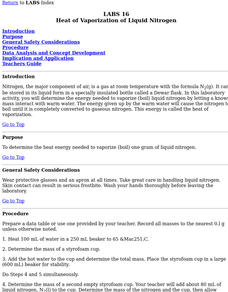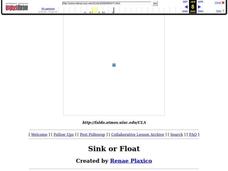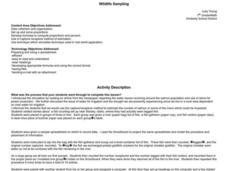Curated OER
Liquid Crystal IR Detector
Students experiment with one method of detecting infrared radiation. They simulate the detection of infrared radiation using a liquid crystal sheet.
Curated OER
Heat of Vaporization of Liquid Nitrogen
Young scholars determine the heat energy needed to vaporize (boil) one gram of liquid nitrogen.
Curated OER
Physical Properties Of Coal
Students examine and identify the observable properties of coal. After a lecture/demo, students perform a simple experiment. They observe samples of coal and record data in an organized manner.
Curated OER
Red River of the North Flooding 1997
Students describe factors that affect the flow of rivers and explain their relationships. They research the factors involved in flooding events. describe the effects of present and future practices in land use, and river control methods.
Curated OER
Mixing Colors
Students listen to a story about mixing colors. They explore color using cups of water, color and coffee filters. They use sight word vocabulary to describe the colors.
Curated OER
Sink or Float
Students construct clay boats and predict whether the boats will sink or float. Students will hypothesize what caused the boats to sink or float.
Curated OER
Teaching about Diel Temperature Variation
Students explore temperature variation in lakes and deal with the data.
Curated OER
Mapping the Ocean Floor
Students study the bottom structure of underwater habitats and how they can be mapped.
Curated OER
Is It Alive?
Eighth graders define the boundaries of living organisms. They determine what makes something a living organism and identify factors that constitute "living." Pupils write a conclusion about the evidence they found that yeast is alive...
Curated OER
Paleogeographic Mapping (o.k. Fossils Are Neat But What Good Are They?)
Students examine how evidence from fossils can be used in paleogeographic interpretation. They gain experience in developing multiple hypotheses.
Curated OER
Physical Difference and Classification
Students use a microscope and observation skills to compare and contrast several physical properties and develop a classification system.
Curated OER
Wildlife Sampling
Seventh graders use paper bags and crackers to simulate a wildlife sampling of salmon. They record data on spreadsheets and determine a formula to estimate salmon populations.
Curated OER
Relative Humidity of Your School
Students predict the location where the relative humidity the highest and lowest in and around their school. They use a sling psychrometer to measure the relative humidity of the various locations.
Curated OER
Science: Hurricanes As Heat Engines
Students conduct Internet research to track the path of Hurricane Rita. They record the sea surface temperature of the Gulf of Mexico during and after the hurricane and draw conclusions about how hurricanes extract heat energy from the...
Curated OER
Streamflow
Students discuss the topic of streamflow and how it occurs. They take measurements and analyze them. They interpret data and create their own charts and graphs.
Curated OER
Japanese Fish Printing
Students examine the characteristics of Japanese fish printing. Using a fresh or frozen fish, they create their own unique fish print. They paint the fish in the colors they chose and place it on a piece of colored paper. They...
Curated OER
Layers Upon Layers - Lesson Plan
Students study rock layers and the sequence of events that occur when a canyon forms. In this sedimentary instructional activity students complete a lab while in groups and discuss what happens.
Curated OER
Phases of Matter
Students describe the motion of solids, liquids and gases. In this chemistry lesson, students describe how temperature affect motion of the particles. They determine the physical properties of each phase.
Curated OER
How Big is a Crowd?
Sixth graders compare the relative sizes of the five Great Lakes and their human populations. They describe some of the problems that arise when many people depend on a limited resoure. Students discuss how the Great Lakes and the...
Curated OER
the Wonder of Wetlands
Students explore the importance of the wetland ecosystem, its properties and functions, as well as, the many birds, animals, and plant life found there.
Curated OER
Twisters
Students build a tornado in a bottle and do various readings to explore tornadoes.
Curated OER
Fish Tank Optics: Learning How Light Travels
Students examine light waves and see how they travel. They explain that light moves in waves, which can bounce off of or go through materials. They use a flashlight to shine on a variety of objects.
Curated OER
Urban Impact on Chollas Creek (California): A Field Study
Students, in groups, take samples from a creek and keep a field journal on their samples. They also perform tests on their samples.
Curated OER
A Rainbow Under the Sea: How Do Animals Survive in the Ocean?
Second graders, with adult help, create a PowerPoint presentation on a selected ocean animal.























